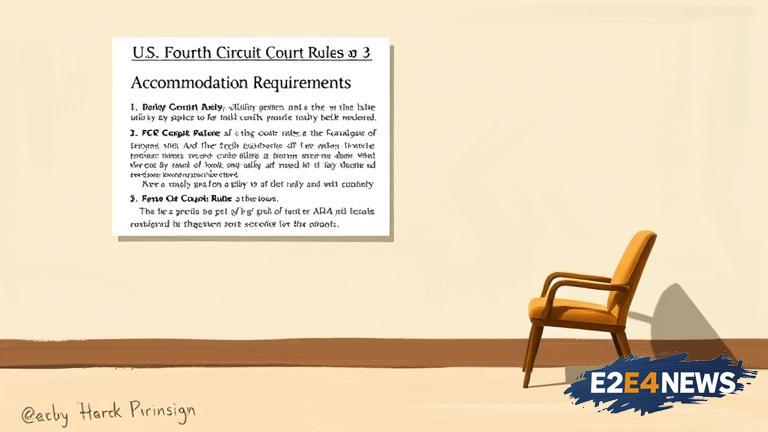The US Fourth Circuit Court has issued a significant ruling regarding the Americans with Disabilities Act (ADA), specifically addressing the obligations of employers to provide accommodations to employees with disabilities. The court’s decision highlights the need for employees to disclose their disabilities to their employers in order to receive accommodations. The ADA requires employers to provide reasonable accommodations to employees with disabilities, unless doing so would cause an undue hardship. However, the court’s ruling emphasizes that employees must inform their employers of their disabilities in order to trigger the accommodation process. The case in question involved an employee who failed to disclose their disability to their employer, despite having a clear opportunity to do so. The employee subsequently requested an accommodation, which was denied by the employer. The court ruled that the employer was not obligated to provide the accommodation, as the employee had not properly disclosed their disability. This decision has significant implications for employers and employees alike, as it clarifies the requirements for ADA accommodations. Employers must now be aware that they are not required to provide accommodations to employees who do not disclose their disabilities. On the other hand, employees must be aware of the importance of disclosing their disabilities to their employers in order to receive accommodations. The court’s ruling also emphasizes the need for clear communication between employers and employees regarding ADA accommodations. Employers should establish clear procedures for employees to disclose disabilities and request accommodations, while employees should be aware of these procedures and follow them accordingly. Furthermore, the court’s decision highlights the importance of documenting all interactions and communications regarding ADA accommodations. Employers should maintain detailed records of all requests for accommodations, as well as any subsequent discussions or decisions. This will help to ensure that employers are in compliance with the ADA and can demonstrate their efforts to provide reasonable accommodations. In addition, the court’s ruling may lead to an increase in employee disclosures of disabilities, as employees become more aware of the importance of disclosure in receiving accommodations. As a result, employers may need to be prepared to handle an increase in accommodation requests and develop strategies for providing reasonable accommodations. Overall, the US Fourth Circuit Court’s ruling provides clarity on the requirements for ADA accommodations and emphasizes the importance of employee disclosure of disabilities. The decision has significant implications for employers and employees and highlights the need for clear communication and documentation regarding ADA accommodations. The ruling also underscores the importance of employer-employee collaboration in providing reasonable accommodations and ensuring compliance with the ADA. In conclusion, the US Fourth Circuit Court’s decision is a significant development in the area of ADA accommodations and will likely have a lasting impact on employer-employee relationships and the provision of reasonable accommodations. The decision serves as a reminder of the importance of clear communication, documentation, and collaboration in ensuring compliance with the ADA and providing reasonable accommodations to employees with disabilities.
